01/16/19
K-State Current - January 16, 2019
K-State Current is a weekly news update for the Kansas Board of Regents to apprise the Regents on a few of the many successes and achievements made by K-State faculty, staff and students.
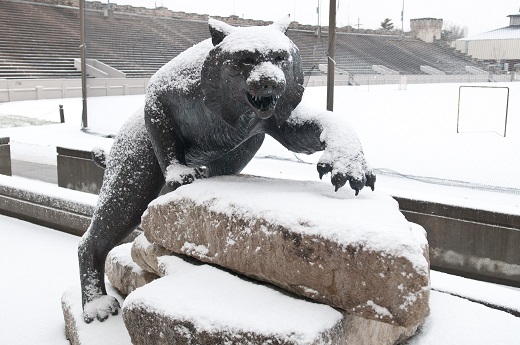
K-State News
Kansas State Veterinary Diagnostic Laboratory cautions about chronic wasting disease in Kansas
The Kansas State Veterinary Diagnostic Laboratory at Kansas State University is reporting a gradual uptick in the number of positive cases of chronic wasting disease in Kansas, with northwestern counties being the worst affected.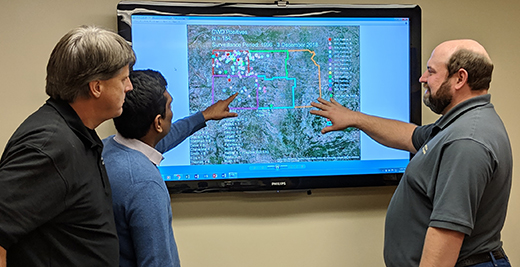
The fatal disease is found in deer and elk. According to the diagnostic laboratory, as of Dec. 3, 184 positive cases of the disease have been identified in the state since 2009. The uptick is based on evaluation of the number of cases submitted to the lab over the years.
"Chronic wasting disease is a transmissible spongiform encephalopathy caused by abnormal prions — or proteins — that affect members of the deer family: white-tailed deer, mule deer, elk and moose," said Ram Raghavan, geospatial epidemiologist with the diagnostic laboratory. "Since its first observation in 1967, chronic wasting disease has spread to 25 states in the U.S., including Kansas, and to two Canadian provinces."
In some states, the disease has steadily increased among free-ranging and captive cervid herds, particularly white-tailed deer, Raghavan said. No treatments or vaccines are available.
"It is believed that in some areas where chronic wasting disease is prevalent, white-tailed deer populations will decline to unrecoverable levels in the long term if the disease is not adequately managed," he said.
Such a decline in the state’s white-tailed deer population could have significant economic effects in Kansas as a recent Southwick Report found that deer hunting is an important economic driver in in the state, Raghavan said, particularly in small, rural communities where some jobs and retail businesses rely on hunting. The report also found that deer hunting is a major source of out-of-state revenue for the state, he said.
Raghavan, who is also an assistant professor in the university's College of Veterinary Medicine, said the majority of cases in Kansas have primarily been found in the upper northwestern counties, with a prevalence level of this disease reaching upward of 20 percent among white-tailed deer in some counties. Positive cases also have been confirmed in other central and western Kansas areas.
"The chronic wasting disease prion is transmitted from infected to noninfected deer through exposure to feces, urine and saliva, and also from environmental sources such as soil and potentially plant materials," Raghavan said. "The prions can survive in soil up to two years or more."
Recent studies from other parts of the nation have indicated certain types of soil, such as those with a higher clay content, favor longer chronic wasting disease prion survival. Raghavan has worked closely with Shane Hesting, wildlife disease coordinator at the Kansas Department of Wildlife, Parks and Tourism. Using Kansas deer samples submitted to the Kansas State Veterinary Diagnostic Laboratory for chronic wasting disease testing over the past several years, Raghavan has found similar associations. Positive Kansas deer samples for the disease tended to originate from geographical areas with soils that have higher clay content, possibly lower pH and low runoff.
"This finding is significant as it adds to other independently emerging evidence of environmental risk factors for chronic wasting disease," Raghavan said. "Further in-depth geospatial studies will help us determine specific chronic wasting disease risk factors and the level of association with geographical drivers."
The information is vital for efforts to effectively manage and prevent the movement and potential further spread of chronic wasting disease within the state, Raghavan said.
Currently, the disease is not thought to cross the species barrier and affect humans, cattle or other domesticated animals. The Centers for Disease Control and Prevention offers recommendations for safety and to decrease potential risk of exposure to chronic wasting disease by hunters at cdc.gov/prions/cwd/prevention.html.
The Kansas State Veterinary Diagnostic Laboratory is offering free chronic wasting disease test kits to all hunters, veterinary practitioners and producers. The test kits include sample collection instructions, containers of formalin, packaging material, a shipping container and test submission forms. While the kits are free, there is a $7 charge for shipping the kit from the diagnostic lab. Kits can be ordered by calling the lab's client care at 866-512-5650 or by email to clientcare@vet.k-state.edu.
The lab also offers the chronic wasting disease test for $28 per animal, with a turnaround time of around three to four days. For submissions containing whole cervid heads, an additional processing charge of $15 per head will be added. For further instructions on how to collect and package samples for CWD testing, go to the Kansas State Veterinary Diagnostic Lab YouTube channel at youtube.com/watch?v=jzmFN6tVa_k.
A research study on low noise and high-performance transistors led by Suprem Das, assistant professor of industrial and manufacturing systems engineering, in collaboration with researchers at Purdue University, was recently published by Physical Review Applied.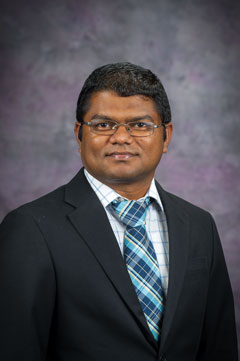
The study has demonstrated micro/nano-scale transistors made of two-dimensional atomic thin materials that show high performance and low noise. The devices are less than one-hundredth of the diameter of a single human hair and could be key to innovating electronics and precision sensing.
Many researchers worldwide are focusing attention on building the next generation of transistors from atomic scale "exotic" 2D materials such as molybdenum di-selenide. These materials are promising because they show high-performance transistor-action that may, in the future, replace today's silicon electronics. However, very few of them are looking at yet another important aspect: the inherent electronic noise in this new class of materials. Electronic noise is ubiquitous to all devices and circuits and only worsens when the material becomes atomic thin.
A recent study conducted by Das' research team has systematically shown that if one can control the layer thickness between 10 and 15-atomic thin in a transistor, the device will not only show high performance — such as turning the switch "on" — but also experience very low electronic noise. This unique finding is essential to building several enabling technologies in electronics and sensing using a number of emerging 2D materials. This research is a comprehensive effort of a previous finding, where Das' team conducted the first study on noise in MoSe2 transistors.
A patent application has been filed by Kansas State University Research Foundation, or KSURF, on this technology. Contact KSURF with questions or to learn more about this new innovation at tech.transfer@k-state.edu.
K-State Faculty Highlights
Richardson stepping down as dean, CEO of university's Olathe campus
Ralph C. Richardson has announced plans to retire as the dean and CEO of Kansas State University's Olathe campus before July 1. He has served in the position since August 2015.
"I certainly have mixed emotions about retiring, as I've never enjoyed my work more and am proud of what has been achieved at the Olathe campus in the last several years," Richardson said. "President Myers and Provost Taber are leading K-State forward in unprecedented ways. I love being part of their team and working with faculty and staff, my fellow deans and other university administrators. However, it is imperative to focus on succession planning, especially with the new budget model and strategic enrollment management initiatives coming on board. I want the new leader of the Olathe campus to be well prepared to embrace the opportunities that are coming to K-State through engagement with Greater Kansas City."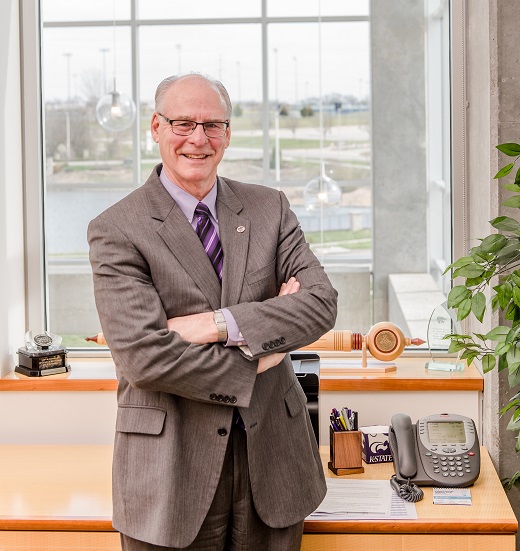
Under Richardson's leadership, Kansas State University used the Olathe campus to expand its outreach and services to Greater Kansas City to elevate the university's profile in academics, research and service in the region and generate new opportunities for students and faculty.
Richardson helped establish and oversee numerous partnerships that are being used to develop a recruitment and support infrastructure for Kansas City-based undergraduate students to attend Kansas State University and working professionals to enroll at the university's Olathe campus.
A proponent of student engagement, Richardson emphasized outreach to the numerous K-12 school districts in Johnson and Wyandotte counties in the form of science-related activities that fostered students' interest as a way to encourage them to pursue an advanced education and a career in high-demand fields.
In partnership with university departments and colleges, several academic programs were added to the campus's offerings that address workforce demand in the region. Programs include the master's degree in school counseling, doctorate in counselor education and supervision, and the professional science master's degree and certificates.
Similarly, Richardson focused on increasing engagement and collaboration with industry partners to create new opportunities in research and education for working adults, graduate students and faculty. Several businesses and organizations established presences at the campus, including Ceva Animal Health, Maxxam Analytics, the American Association for Industry Veterinarians and Digital Sandbox KC — a program through the city of Olathe that provides funding and resources for entrepreneurs.
Richardson also served in active roles on the Agribusiness Council of Kansas City and the Olathe and Greater Kansas City chambers of commerce.
"Ralph leaves a distinguished footprint at K-State through his leadership not only as dean and CEO of the Olathe campus, but also in his previous role as dean of the university's College of Veterinary Medicine," said Richard Myers, Kansas State University president. "Ralph has played an active role in moving K-State forward in times of great change for both veterinary medicine and higher education. Through his leadership and passion for helping others, Ralph advanced numerous research opportunities at K-State while providing students with an exceptional education and experiences that will benefit them throughout their lives. He was also a visionary in exploring new initiatives for K-State to be engaged in the Greater Kansas City community.
Before his appointment overseeing the Olathe campus, Richardson served as dean of the university's College of Veterinary Medicine for nearly 20 years. Under his guidance, the college experienced increased student enrollment; raised more than $72 million in private support for scholarships and seven permanently endowed professorships; introduced the Veterinary Training Program for Rural Kansas, which offers a debt repayment incentive for graduates to work in rural practices in Kansas; increased faculty and staff numbers, with many receiving national and international attention for their teaching, research and service efforts; aligned research and educational programs to meet the needs of the federal government's National Bio and Agro-defense Facility, or NBAF, which is being built just north of the college; and much more.
Richardson joined Kansas State University in 1998, coming from Purdue University where he was a professor and head of the veterinary clinical sciences department and a 22-year faculty member of the university. At Purdue, he helped establish an ongoing comparative oncology program, utilizing naturally occurring cancer in pet animals as models for people. Before starting his academic career, Richardson served in the Army Veterinary Corps and worked as a private practice veterinarian in Miami. Richardson is a diplomate of the American College of Veterinary Internal Medicine in the specialty of internal medicine and a charter diplomate of the American College of Veterinary Internal Medicine's specialty of oncology.
He received his bachelor's degree in biology in 1969 and a Doctor of Veterinary Medicine from Kansas State University in 1970. He also completed an internship in small animal medicine and surgery at Purdue in 1973, a residency in small animal internal medicine at the University of Missouri in 1975, and a training program in clinical oncology at the University of Kansas Medical Center in 1978.
A search for a replacement dean and CEO of the Olathe campus will begin in the near future.
Engineering professor named to watch list
Julia Keen, professor and Tointon engineering chair in the GE Johnson Department of Architectural Engineering and Construction Science at Kansas State University, has been named to the inaugural "20 to Watch: Women in HVAC" list by Engineered Systems magazine.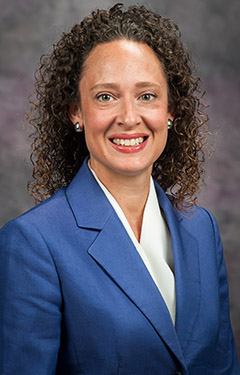
Engineered Systems is an online publication that provides practical, energy-efficient solutions for mechanical engineering projects. Written by engineers for engineers, it delivers new ideas to help commercial, institutional, industrial and government buildings achieve LEED and Energy Star certification.
More than 150 nominations were submitted for the recognition, with the top 20 choices representing all levels of the industry — from those just entering the sector to industry professionals boasting 30-plus years of experience.
Along with her academic career, Keen is also president of the consulting firm, Keen Designs PA. She holds both a bachelor's and master's degree in architectural engineering, and a doctoral degree in curriculum and instruction.
Highly active in ASHRAE, she currently serves the international professional society as vice president, and has been recognized as a fellow and distinguished lecturer, as well as holding its distinguished service, teaching and advising awards.
Keen's insight on her career path, future goals and the role of women in the industry are available in an online interview.
K-State Student News
Personal financial planning program wins big at annual symposium
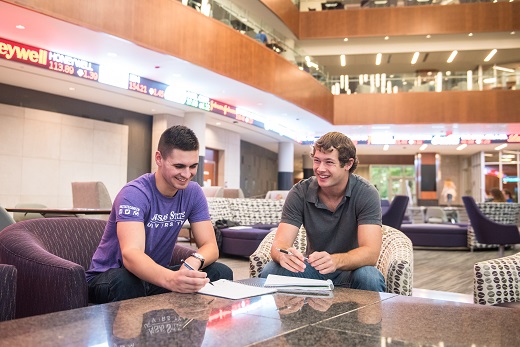
The personal financial planning program met with success at the recent Association for Financial Counseling and Planning Education symposium in Norfolk, Virginia.
For the undergraduates, the Financial Counseling Knowledge Bowl Challenge team walked away with a fourth-place finish in the finals. The team was comprised of Adam Eilert, senior; Philip Wegman, junior; and Jessica Lickteig, junior. The team earned the right to participate in the finals after an initial round where student teams submitted papers on issues in financial counseling.
The graduate students also saw success at the conference. Andrew Scott, Juan Gallardo and Chris Moore, all doctoral students, received the Student Paper Award for their paper, "Change in Financial Knowledge Post Peer Financial Counseling." This paper was chosen by a review committee that sought to identify a student authored conference paper that is of great use to the profession.
Frank Magwegwe, doctoral student, and HanNa Lim, assistant professor, received the Best Paper Award for their paper, "Theory of Planned Behavior and Retirement Preparation." This paper was awarded to the best paper presented the symposium, similarly evaluated for its ability to impact the financial counseling and planning professions.
Lastly, Allen Ammerman, a spring 2017 doctoral graduate, and Maurice MacDonald, professor, were awarded the Outstanding Research Journal Article Award for their article, "Future Orientation and Household Financial Asset Liquidity." This article was selected as the best paper published in the Journal of Financial Counseling and Planning the preceding year by the editorial staff. This is the most prestigious award offered by the journal.
"We are very proud of our students and faculty," said Martin Seay, program director. "The variety and depth of these awards are reflective of the excellence at all levels within our program."
The Association for Financial Counseling and Planning Education is the nationally recognized leader in financial counseling, coaching and education. Bringing together research, education and practice, they support the profession through comprehensive training, professional development and high-quality resources to help improve the economic well-being of individuals and families worldwide.